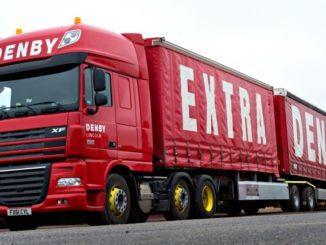
As first reported on motortransport.co.uk, it looks as though some 20 years of campaigning by Dick Denby of Denby Transport in Lincolnshire is about to pay off and the government will give the go ahead for trials of the Denby Eco-Link B-double road train from next month.
It is many years since questions were first raised about the future capacity needs for road haulage and the realisation that our current reliance on the 13.6m long triaxle trailer would be unlikely to satisfy the capacity needed in years to come.
The government’s decision comes as the consultations on the 48-tonne intermodal freight trial closed in early January and on the longer semi-trailer (LST) trial closed at the beginning of February. These appear to be positive signs that the government recognises the need to address the freight capacity issue, although the DfT has yet to seek decisions on either consultation from government ministers.
What is not clear at this stage is whether the trial of the Denby Eco-Link will be permitted to proceed at 60-tonnes gross combination weight (GCW) on eight axles compared with the current 44-tonnes on six axles. At that weight, two Eco-Link B-doubles could replace three conventional 16.5m long artics. These vehicles could also provide reduced axle loads with an average of 7.5-tonnes per axle, reducing the potential for road damage.
Even allowing for the greater weight, if two Eco-Link road trains were able to replace three conventional artics, this would yield a reduction in overall fuel consumption, reducing costs as well as carbon dioxide and toxic pollutant emissions in the process.
Kevin Buck, managing director of Hazcomp, who has been involved in Denby’s campaign told MT: “60-tonne B Doubles suffer a lot less with individual axle overloading than a standard five-axle 40-tonne articulated vehicle operating in Europe.”
Read more
- Denby Eco-Link to hit the road ahead of major trial of 25-metre artics
- Dick Denby still hopeful for road trial of Eco-Link after 17 years
Although this all makes for a compelling argument, politicians and the general public tend to look at overall weight and size. Individual axle permitted weights and loadings take some explaining - and even though there is a positive case where cost, fuel consumption, emissions and road damage are concerned, 60 tonnes is a large increase over 44-tonnes and a 25.25m long combination is notably longer than 16.5m artic. This is where ministerial nervousness and civil service caution in anticipation of that nervousness could conspire to reduce the trial gross weight from 60-tonnes.
That would then hang a question mark over the point of the trial. Trials are run to gather as much data as possible and if the trial were to start by significantly reducing the options that could be included, it would substantially reduce the amount of useful data that could be gathered from the trial.
The additional weight of the second trailer would add somewhere between six and eight tonnes to the weight of the combination. Consequently, if trials were operated at 50-tonnes GCW, the additional weight would not offer an increase in payload compared with a 44-tonne GCW standard artic and may even offer a reduced payload. The Denby Eco-Link could carry around 12 to 14 more standard pallets than is possible with a 13.6m tri-axle trailer.
Commenting on the trial, Buck at Hazcomp said: “They offer the best environmental, commercial and operational benefits at 60-tonnes GCW, so anything less will be a compromise too far that would jeopardise any trial and potential take up of these vehicles.”
In a recent email to a DfT official, Dick Denby pointed out that LHVs are operating in six European countries at 60-tonnes GCW, and fearful that the government might want to run the trial at a lower gross weight added: “Many would find it difficult to imagine why the government would want us to run part loaded.”
Separately, DfT has told MT: “The Denby Eco-link is to be permitted specifically for tests. The details of the necessary permits, including operating arrangements and conditions of use, are to be finalised. Further consideration is being given about whether to allow more vehicles of this kind to be used for testing and, if that is the case, how to design a wider trial.”
One of the issues believed to be concerning the DfT is driver licensing to drive the Denby Eco-Link. Denby Transport’s own training department would be happy for any C+E licence holder to drive, if supervised by one of the company’s qualified trainers. If a more cautious approach is favoured, Denby has suggested that drivers licensed to STGO category two may offer a suitable starting point for the trials.













